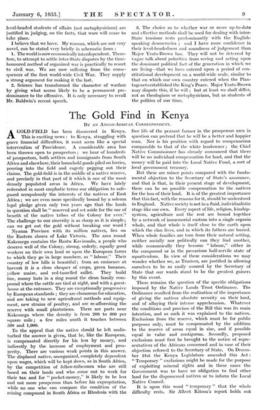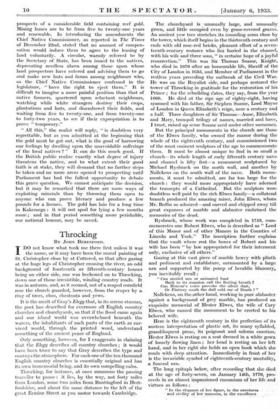The Gold Find in Kenya
By AN ANGLO-AFRICAN CORRESPONDENT.
AGOLD-FIELD has been discovered in Kenya. This is exciting news : to Kenya, struggling with grave financial difficulties, it must seem like a special intervention of Providence. A considerable area has been thrown open to prospectors ; we hear of hundreds of prospectors, both settlers and immigrants from South Africa and elsewhere, their household goods piled on lorries, pouring into the field and eagerly pegging out their claims. The gold-field is in the middle of a native reserve, and precisely in that part of it which is one of the most densely populated areas in Africa. We have lately reiterated in most emphatic terms our obligation to safe- guard scrupulously the interests of the natives of East Africa ; we are even more specifically bound by a solemn legal pledge given only two years ago that the lands in question shall be " reserved and set aside for the use of benefit of the native tribes of the Colony for ever." The challenge to our sincerity is as sharp as it is simple ; can we get out the gold without bn-mking our word ?
Nyanza Province with its million natives, lies on the Eastern shares of Lake Victoria. The area round Kakcmega contains the Bantu Kavirondo, a people who deserve, well of the Colony, strong, orderly, equally good workers on their own land or upon the European farms to which they go in large numbers, as "labour." Their country of low hills is beautiful ; from an eminence at harvest it is a close chequer of crops, green bananas, yellow maize, and red-tasselled millet. They build line, roomy huts in a ring round the clean family com- pound where the cattle are tied at night, and with a guest- house at-the entrance. They are exceptionally progressive by European standards ; they are clamorous for education, and are taking to new agricultural methods and equip- ment, new strains of poultry, and are re-afforesting the reserve with small plantations. There are parts near Kakemega where the density is from 200 to 300 per square mile ; a few miles south it touches between 500 and 1,000.
. To the appeal that the native should be left undis- turbed the answer is given, that he, like the European, is compensated directly for his loss by money, and indirectly by the increase of employment and pros- perity. There are various weak points in this answer. The displaced native, unorganized, completely dependent upon wages, which will be kept down, as in South Africa, by the competition of fellow-tribesmen who are still based on their lands and who come out to work for their tax and for "pocket-money," is likely to be less and not more prosperous than before his expropriation, while nn one who can- compare the condition of the mining compound in South Africa or Rhodesia with the free life of the peasant farmer in the prosperous area in question can pretend that he will be a better and happier man. Nor is his position with regard to compensation comparable to that of the white landowner ; the Chief Native Commissioner has already announced that them will be no individual compensation for land, and that the money will be paid into the Local Native Fund, a sort of local government treasury.
But these are minor points compared with the funda- mental objection to the Secretary of State's assurance, and that is that, in their present stage of development; there can be no possible compensation to the natives for the loss of their land. It is of the greatest importance that this fact, with the reasons for it, should be understood in England. Native society is not in a fluid, individualistic stage like our own. Every aspect of life, religion, kinship. system, agriculture and the rest are bound together by a network of immemorial custom into a single organio whole, and that whole is itself close to the earth upon which the clan lives, and in which its fathers are buried. When whole families are torn from their natural setting, neither socially nor politically can they find another, while economically they become "labour,"' either ifs the compound or in the precarious half-servile state of squatterdom. In view of these considerations we may wonder whether we, as Trustees, are justified in allowing ourselves to be so easily assured by the Secretary of State that our wards stand to be the greatest gainers by this event.
There remains the question of the specific obligations imposed by the Native Lands Trust Ordinance. The Ordinance resulted from the realization of the importance- of giving the natives absolute security on their land, and of allaying their intense apprehension. Whatever the conditions and provisos of the Bill this was its main intention, and as such it was explained to the natives. Exclusions from the reserve, which must be for public purposes only, must be compensated by the addition to the reserve of areas equal in size, and if possible equal in value and contiguous. Secondly, proposed exclusions must first be brought to the notice of repre- sentatives of the Africans concerned and in case of their objection referred to the Secretary of State. On Decem- ber 21st the Kenya Legislature amended this Act : "
Temporary" exclusions might be made for the purpose of exploiting mineral rights and in these cases the Government was to have no obligation to find other land for the dispossessed natives or to inform the Local Native Council.
It is upon this word " temporary " that the whole difficulty rests. Sir Albert Kitson's report holds out
prospects of a considerable field containing, reef gold. Mining leases are to be from five to twenty-one years and renewable. In introducing the amendments the Chief Native Commissioner, as reported in The Times of December 22nd, stated that no amount of compen- sation would induce them to agree to the leasing of land voluntarily. A circular, warmly referred to by the Secretary of State, has been issued to the natives, deprecating needless alarm among those upon whose land prospectors have entered and advising them to go and make new huts and farms among neighbours who, as the Chief Native Commissioner confessed in the legislature, "have the right to eject them." It is difficult to imagine a more painful position than that of native farmers, quartered upon reluctant neighbours, watching while white strangers destroy their crops, plantations and huts, and disembowel their fields, and waiting from five to twenty-one, and from twenty-one to forty-two years, to see if their expropriation is to prove "temporary."
"All this," the realist will reply, "is doubtless very regrettable, but as you admitted at the beginning that the gold must be got out, What is the good of harrowing our feelings by dwelling upon the unavoidable sufferings of the local natives ? " It can do this much good. If the British public realize exactly what degree of injury threatens the native, and to what extent their good faith is at stake, they will demand that no further steps be taken and no more areas opened to prospecting until Parliament has had the fullest opportunity to debate this grave question. We cannot anticipate the decision, but it may be remarked that there are more ways of exploiting minerals than by throwing them open to anyone who can prove literacy and produce a few pounds for a licence. The gold has lain for a long time in Kakemega : it will not spoil for lying a few months more ; and in that period something more perishable, our national honour, may be saved.





































 Previous page
Previous page